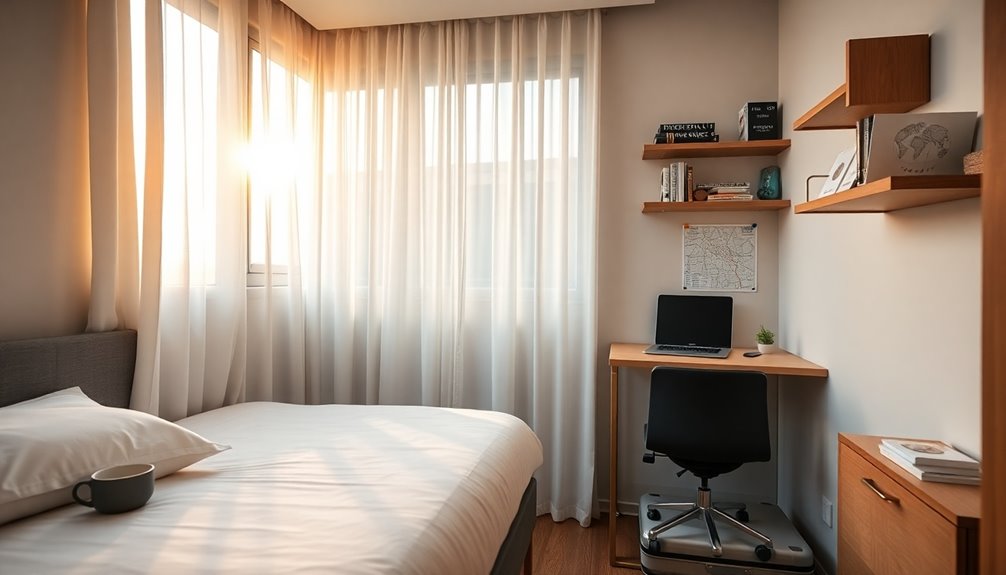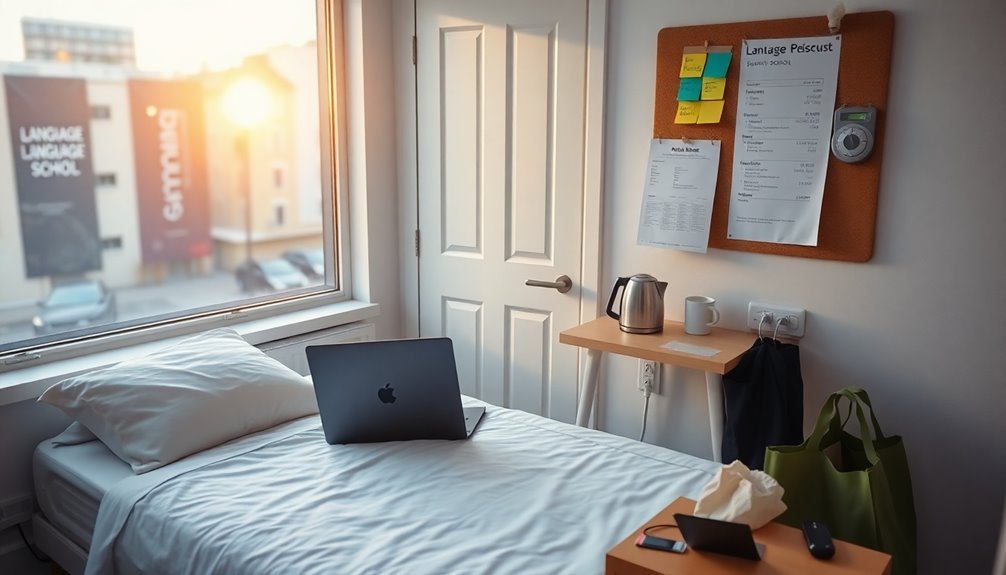
You’ll want short-term rentals close to your school and transport, in a neighborhood that’s safe, diverse, and not overly touristy. Pick flexible leases with clear subletting, cancellation, and utility terms, and weigh private studios against shared rooms for privacy and cost. Verify secure entry, detectors, and responsive management, plus quiet study spaces and bike/transit options for commutes of 15–30 minutes. Photograph the unit at move-in and get written agreements—keep going to see practical checklist items and sources.
Choosing the Right Neighborhood for Language Study
When you pick a neighborhood for a short-term language course, focus on factors that directly affect study and daily practice: proximity to your school, public transport options, noise levels during study hours, and access to places where locals gather (cafés, markets, community centers). You’ll want neighborhood diversity that supports safe, everyday language use without stretching your comfort zone. Scan crime statistics, lighting, and emergency services access so your routine feels secure. Prioritize streets where locals convene—markets and cafés that encourage conversational practice—while avoiding overly touristy zones that limit genuine interaction. Seek accommodations with quiet study spaces and reliable locks, and confirm building management responds promptly to issues. Check online community groups for firsthand accounts of cultural immersion opportunities and practical tips on weekends or evenings. Balance sociability with predictability: choose a district where you can practice frequently, rest reliably, and get help quickly if needed.
Proximity to Schools and Public Transportation
Because your daily routine will hinge on getting to class and back without stress, prioritize rentals that cut commute time and offer easy access to reliable public transit; aim for a 15–30 minute door-to-school journey by foot or a single transit line to minimize delays and maximize study time. You’ll want to confirm school accessibility by mapping walking routes at the time of day you’ll commute — check lighting, sidewalks, crossings, and typical crowding. Evaluate transit options: frequency, hours, safety records, and proximity of stops. Ask hosts about nearby late-night services and secure bike storage if you prefer cycling. Verify that neighborhood crime rates and station lighting meet your safety standards, and look for accommodations near staffed stations or well-trafficked routes. Prioritize locations with multiple viable routes in case of service disruptions, and confirm clear, written directions from the rental to the school and nearest transit link so you’ll always have a reliable plan.
Short-Term Lease Options and Flexibility
If you need flexibility for a language course that runs a few weeks to a few months, look for rentals offering short-term leases, week-to-week bookings, or clear subletting policies so you won’t be locked into a long contract or unexpected penalties. You’ll want clear terms: check minimum and maximum stay lengths, notice periods, penalty calculations, and whether utilities or deposits are prorated. Use reputable rental platforms that display contract templates and tenant reviews so you can verify claim consistency and host responsiveness. Ask hosts for written confirmation of any verbal exceptions and keep a copy of the signed lease. Confirm safety measures—secure entry, working locks, and emergency contacts—are stated in the listing. If you might extend, make certain the lease allows rollover or a simple renewal without reassessment of your background. Finally, compare cancellation and refund policies side-by-side; prioritizing transparent, flexible contracts reduces stress and keeps you focused on studying.
Shared Apartments vs. Private Studios
Choosing between a shared apartment and a private studio comes down to balancing cost, privacy, and social needs: shared units usually lower your rent and utility bills and offer built-in social support and language practice, while private studios give you uninterrupted study time, greater control over routines, and more secure storage for belongings. If you prefer shared living, you’ll benefit from daily conversational practice and lower expenses, but you should confirm roommate expectations, cleaning schedules, and quiet hours to protect study focus. If you choose a private studio, you’ll retain personal space and predictable routines, which helps with concentrated coursework and secure storage of valuables. Consider hybrid options like single rooms in small-house shares for a middle ground. Whatever you select, prioritize clear communication in the lease, documented rules, and reliable contact points for issues. That way you’ll maintain both comfort and the consistent environment you need for effective language study.
Safety and Amenities to Prioritize
When you’re booking short-term housing for a language course, prioritize clear safety features and practical amenities that support study and daily life: verified locks and secure entry, functioning smoke and CO detectors, well-lit common areas and street access, and a reliable Wi‑Fi connection with sufficient speed for video lessons. You’ll want documented safety measures — landlord or platform-provided procedures for emergencies, visible evacuation routes, and local emergency contacts. Check that the unit has essential amenities: a quiet workspace or desk, adjustable lighting, and plug access for devices; a dependable heating/cooling system; and basic kitchen equipment for simple meals. Inspect photos and ask for recent maintenance records to verify condition. If you’ll share common areas, confirm cleaning routines and respectful house rules. Prioritize proximity to public transport and daytime activity levels for added security. Before confirming, request a short video walkthrough and clear written agreements on arrival, keys, and incident reporting so you’re protected and focused on learning.
Budgeting for Rent, Utilities, and Fees

Because short-term stays often include extra fees and variable utility costs, you’ll want a clear monthly (or weekly) budget that separates base rent from add-ons like cleaning, platform/service fees, security deposits, and refundable damage holds. Start by listing fixed commitments—rent, mandatory platform fees—and estimate variable items: utility costs, extra cleaning, laundry, and internet surcharges. Use conservative estimates for peak-season utility spikes and factor a contingency equal to 10–15% of monthly expenses for unexpected charges or local tax changes.
Adopt simple budgeting strategies: a two-column ledger (fixed vs. variable), automated transfers for recurring costs, and receipts foldering to track refunds and disputes. Verify what’s included before booking so you’re not surprised by pro-rated bills or service call fees. If a landlord requires a deposit, confirm refund timelines and inspection criteria in writing. These steps keep you financially secure, reduce conflict risk, and help you focus on studies without worrying about hidden rental costs.
Finding Rentals Near Cultural and Language Resources
If you want to get the most from a language course, prioritize rentals within walking distance or a short transit ride of libraries, language centers, theaters, community centers, and conversation meetups so you can practice outside class without long commutes. You’ll want to map nearby resources and note operating hours, peak safety times, and transit options. Choose well-lit streets and neighborhoods with steady foot traffic for safer evening returns from events or cultural experiences. Confirm proximity to official language exchanges and vetted community groups rather than informal, unverified meetups. Ask landlords or hosts about local emergency services, neighborhood watch programs, and typical noise levels. When viewing listings, verify exact distances—walking time is more useful than miles—and check transit reliability for nights and weekends. Prioritize properties with clear entry security, good reviews from other students, and refundable short-term arrangements so you can adjust if a location doesn’t support your study needs or safety expectations.
Lease Terms, Deposits, and Local Regulations
Although short-term rentals can seem flexible, you’ll want to scrutinize lease terms, deposit rules, and local regulations before committing, since these elements determine your rights, financial exposure, and options for early departure. Read lease agreements line by line: note start/end dates, renewal clauses, subletting permissions, and penalties for breaking the term. Confirm who’s responsible for utilities, maintenance, and repairs, and insist on written amendments. For security deposits, document move-in condition with photos, get a written receipt, and clarify maximum allowable deductions and the timeline for returns. Check local regulations for short-term stays, registration requirements, occupancy limits, and noise or zoning restrictions that could affect your safety or ability to remain. Ask about landlord liability and emergency contact procedures. If something seems ambiguous, request clarification or a revised clause before signing. Prioritize clear, written terms so you can protect your finances and personal safety while studying abroad.
Tips for Moving In and Building Local Connections
When you move in, take a methodical approach: walk through every room with the landlord or property manager, photograph existing damage with timestamps, and get their signatures on a move-in condition checklist so you’ll have clear evidence for your deposit return. Next, secure your space: test locks and windows, note emergency exits, and confirm smoke and CO detectors work. Keep copies of keys and local contact numbers in a safe place.
To build connections safely, start small: attend vetted networking events and local meetups focused on language exchange or student groups. Bring ID, plan your route, and tell a roommate or host where you’ll be. Prioritize daytime or well-attended venues at first.
Exchange contact details with a few trusted peers and establish simple check-ins. Use official university or program channels to verify events, and avoid unverified offers for housing or services. You’ll protect yourself and create a reliable social circle that supports learning and safety.
Some Questions Answered
Can Hosts Provide Study Materials or Tutor Referrals?
Yes — you can provide study resources and offer tutor connections, as long as you clearly state they’re optional, non-mandatory services and don’t imply academic accreditation. Be transparent about costs, credentials, and any referral fees, and keep written records. Encourage safe, vetted interactions by sharing verified profiles, reviews, and meeting locations. You should also respect privacy, avoid pressuring guests, and follow local laws and platform policies when making referrals.
Are Short-Term Rentals Furnished for Remote Work/Study?
Like a well-tuned workshop, many short-term rentals are set up for remote work/study: you’ll find a dedicated remote workspace, reliable Wi‑Fi, ergonomic seating, good lighting and clear rental amenities lists. Hosts usually note desk space, outlet availability, printer access, and quiet hours. You can ask about security features, backup power and workspace privacy. If something’s missing, request specific additions or photos before booking to guarantee safety and comfort.
Do Rentals Include Laundry and Cleaning Services?
Yes — many rentals include laundry services and cleaning options, though availability varies by property. You’ll often find on-site washers/dryers or token laundry, plus optional scheduled cleaning or move-out tidies for an extra fee. Confirm service frequency, pricing, and turnover cleaning policies before booking. Ask for secure laundry facilities, staff ID verification, and written cleaning checklists to guarantee consistent, safe standards during your stay.
Is High-Speed Internet Guaranteed and Measured?
Yes — high-speed internet is generally guaranteed, with 92% of stays reporting at least 50 Mbps. You’ll get clear internet speed commitments and measured results via posted tests or provider logs. Connectivity options vary: wired Ethernet, dual-band Wi‑Fi, and sometimes mobile hotspots. Hosts are expected to disclose typical speeds, peak times, and backup plans. You’ll have the information needed to assess reliability and maintain safety-conscious connectivity.
Are Pets Allowed for Month-To-Month Stays?
Yes — pets can be allowed for month-to-month stays, but it depends on specific pet policies and rental agreements. You’ll need to confirm breed, size, vaccination records, and any additional deposit or monthly fee. Rental agreements will spell out cleaning, damage responsibility, and quiet-time rules to guarantee safety and neighbor comfort. Review the agreement carefully, ask for clarifications, and get all pet approvals in writing before moving in.
Summing Everything Up
You can do this — the right short-term rental brings you closer to class, culture, and conversation without trapping you in a long-term commitment. Choose a neighborhood that feels safe, near transit and schools, and balance cost with amenities; consider a shared flat to save money and meet locals, or a studio for focused study. Read lease terms, know deposits and regs, and move in with a plan to make friends and practice the language from day one.
